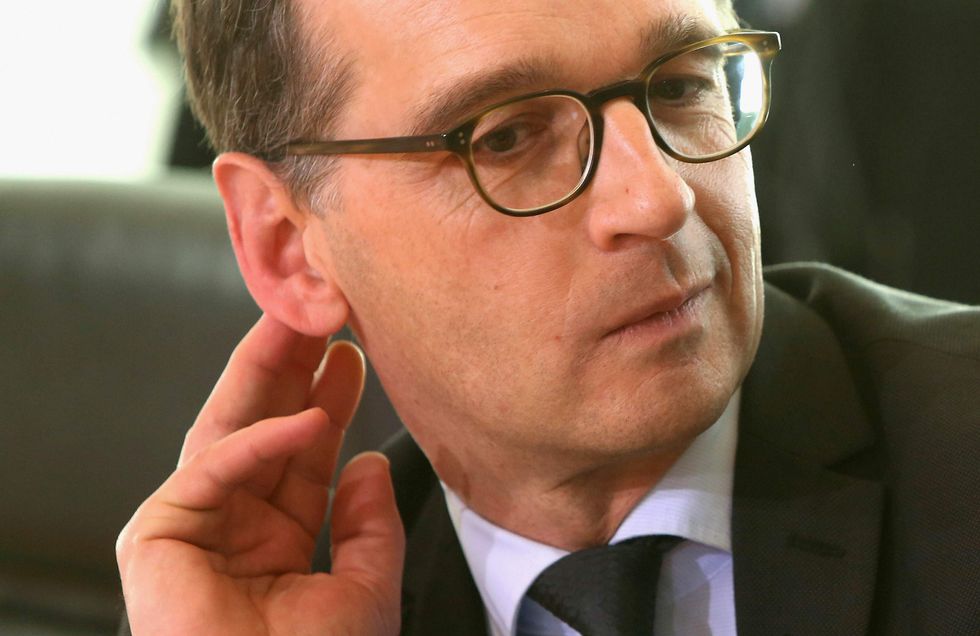
German Justice Minister Heiko Maas has proposed legislation that could harshly punish social media companies who fail to promptly remove "hate speech" and "fake news." (Adam Berry/Getty Images)

A German government minister is warning social media giants like Facebook and Twitter that they could soon face massive daily fines for failing to do enough to prevent "illegal" content from being posted online, including "hate speech" and "fake news."
According to the New York Times, Heiko Maas, Germany’s minister of justice and consumer protection, is proposing a law that would impose hefty fines — as much as the equivalent of $53 million per day — if they do not implement controls to prevent private users from posting speech that falls under the German government's strict definition of "hate speech," as well as terrorist propaganda and false news stories. According to a statement released with the proposed legislation, companies would be required to respond faster to complaints about allegedly illegal content and to remove "obviously criminal content" within 24 hours. Posts that are less obviously illegal under German law would have to be removed within seven days.
According to Deutsche Welle, the proposed regulation would require social media companies to take a number of specific steps to combat "illegal speech":
Social networks will also be obliged to offer users "an easily recognizable, directly reachable, and constantly available" complaint process for "prosecutable content," which includes libel, slander, defamation, incitement to commit a crime, hate speech against a particular social group, and threats.The companies will then immediately have to check the complaints and delete all illegal content within seven days - while any content deemed "obviously illegal" must be deleted within 24 hours. The complainant must be also informed of the result of their complaint.
The German government had previously set a goal for social media giants Facebook and Twitter of 70 percent removal of objectionable content within a 24 hour window — neither company met that goal, according to the German government. According to the Times:
The yearlong study noted that while the two companies eventually erased nearly all illegal hate speech, in January and February, Facebook managed to delete 39 percent in the time frame sought by the German authorities and Twitter 1 percent. Google’s YouTube video service fared the best, taking down within 24 hours 90 percent of all content flagged.
Since September, the figure for Facebook has fallen by seven percentage points, while Twitter’s takedown rate has not changed. The issue has taken on new urgency as Germany gears up for parliamentary elections in September.
[graphiq id="1xaAu02ybyJ" title="Daily Active Users of Major Social Media Platforms" width="600" height="671" url="https://w.graphiq.com/w/1xaAu02ybyJ" ]
The proposed regulation, if it takes effect, would place social media companies like Facebook and Twitter in a difficult legal position. Because these companies operate across international borders, Germany's proposed regulation would effectively force Facebook and Twitter into a choice between blocking all access to Facebook and Twitter for German users, or essentially allowing one country (Germany) to dictate content policy for Facebook and Twitter across the globe.
Facebook is pushing back against the proposed regulation, claiming that they already do far more than any other platform to ensure compliance with local hate speech laws. Facebook and Twitter also have both participated in a task force originated by Maas which was designed to self-regulate posts and comments in Germany, where it is illegal (among other things) to deny the existence of the Holocaust or to promote Nazi ideology or Nazi symbols.
Many free speech advocates have reacted with growing alarm to governmental efforts like Germany's to regulate speech on the internet, noting that this proposed regulation would allow government regulators to act as arbiters of disputed facts, and to censor social media posting solely on the basis of political viewpoint, either of which would make it difficult for any ruling party currently in power to be ousted in a democratic election.